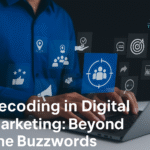In the ultra-connected modern world, trade shows, cold calls and in-person meetings are not the only methods of doing business a company can rely on anymore. The digital front has completely changed how organizations interact, collaborate and form partnerships. B2B digital marketing, i.e. the practice of marketing goods and services between one company to another, has come up as the potent source of growth, exposure, and eventual success.The advent of online platforms, search engines, social media, and information-driven developments has changed the relationship between businesses in a manner known as digital marketing. Companies do not solely depend on trade shows, networking events or cold calls to do business anymore.
What is B2B Digital Marketing?
B2B digital marketing is the practice of using electronic stores, tools and techniques to market goods or services between one company to another. It consists of such activities as:
- SEO Search Engine Optimization: Optimization of websites to come up in higher positions due to searches and get potential customers.
- Content Marketing: Development of informative blogs, case studies, and whitepapers that can be used as per the requirements of the business.
- Email Marketing: The ability to deliver customized campaigns to stay in front of warm leads and maintain relationships.
- Social Media Marketing: The ability to utilize the power of a social medium such as LinkedIn, Twitter and YouTube to firm up brand power.
- Paid Advertising (PPC): Running target advertisement campaigns to target particular industries or job roles.
The end-state of B2B digital marketing is not only to generate traffic but to leverage leads into multi-year partnerships by ensuring that complicated needs have been addressed and quantifiable value is realized.
B2B vs B2C Marketing: Two Worlds, Two Strategies
Decision-Making Process
- B2B thinking is slower, more collaborative and logic-based, centered on long-term gains, return on investment and trust, as opposed to B2C which is a quick, emotional decision..
- Typically, one buyer, fast decisions and trivial factors like trends, price and convenience that influence decisions.
Sales Cycle
- B2B: More lengthy and comprehensive, they may need to take weeks and months due to the size of deals that must be negotiated.
- B2C: Less lengthy and mostly immediate since a consumer makes swift buying decisions.
Marketing Focus
- B2B: It is aimed at relations over time, detailed unit of information, and case studies, ROI-focused content.
- B2C: Paying attention to brand awareness, emotional resonance, entertainment and instant conversions.
Content Style
- B2B: Educative, professional and informative (such as whitepapers, webinars, industry reports).
- B2C: Informative, professional, and interesting (e.g., network activities, business marketing, advertising).
Pricing
- B2B pricing is like a long-term, flexible price that involves much negotiation and relates to business requirements whereas B2C is fixed, transparent and patternized.
- B2C: Direct pricing to the consumers.
B2B Success Formula: The Keys to Lead, Engage, and Convert
1. Lead Generation with Precision
The starting point in B2B success is in drawing the right audience. By leveraging SEO, targeted advertising, LinkedIn and account-based marketing, companies have the means of generating high-quality leads rather than aimlessly following any random prospects.
2. Value-Driven Content
B2B engagement has content as its foundation. Blogs, case studies, whitepapers, webinars will inform the prospects and present your brand as industry experts, form trust prior to the very first sales call.
3. Personalization/Relationship Building
As opposed to B2C, B2B decisions are multi-stakeholders. Individual communication -emails, customized proposals, and solutions- enables clear signs of understanding a client and the ability to build long-term mutually beneficial relationships.
4. Data and Analytics
Smart B2B marketing is analytics-intensive. By monitoring web traffic and web campaign ROI, customer pathways and the web campaign ROI, businesses are able to adjust strategies, enhance targeting and reduce sales cycles.
5. Seamless Conversion Strategies
Turning leads into customers is possible through call-to-actions, websites that are easy to navigate, demos and free trials and prompt customer service. All the touchpoints must eliminate friction and move the prospects towards the purchase.
6. Credibility and trustworthiness
Removing risks for buyers and giving them faith that they are making a good choice can be done by testimonials, case studies, certifications and thought leadership.
B2B Strategy Secrets: How Leading Brands Win Clients
Effective brands in the competitive B2B environment do not depend on luck; rather, they deploy tested-and-proven marketing strategies to hang on to clients. These are the most important strategies that are employed by leading B2B companies:
1. Account-Based Marketing
Instead of targeting a large number of customers, leading brands increase their campaigns with high-value accounts. It is a highly targeted form of laser-like attention that makes customers trust more, and transforms conversion.
2. Empowered Content Marketing
The B2B companies write white papers, case studies, blogs, and webinars to resolve problems in their industry. This is by giving valuable insights they position themselves as thought leaders.
3. Search Security and Search Visibility
Good SEO would mean that it will place businesses in the locations that prospective buyers can find. By optimizing towards keywords relevant in the industry, we are able to bring in potential leads without having to pay.
4. Social Media Chatter on LinkedIn
LinkedIn is an alliance of B2B networking. It enables leading brands to run targeted advertising, expert posts and vibrant industry communities in order to engage the right audience.
5. Nurture Campaigns via Email
Instead of engaging in aggressive selling, winning brands leverage email to nurture leads, offering them personalized content and keeping them interested all through the buyer process.
Breaking Barriers: Common Challenges in B2B Marketing
Although B2B marketing gives huge opportunities, there are also unique challenges that businesses face and are/should overcome to succeed. B2B deals are slower, more complicated, and involve a greater degree of trust than buying decisions, as is the case in B2C. These are some of the general obstacles experienced in the B2B environment:
1. Lengthy and Overgrown Sales Cycles
B2B purchasing deals with people of many stakeholders and can often have quite a number of investments. This makes the process of decision making long and they involve incessant nurturing before a deal can be sealed.
2. Getting to the Decision Makers
It is hard to get through gatekeepers and gain access to the executives or procurement managers. To reach individuals that make the final purchases, many marketers find it difficult to connect with the real decision-makers.
3. Information overload and differentiation
Though there are plenty that have been creating blogs, case studies, and advertisements, it is difficult to be different. The largest task is to create unique value-added content that can overcome the cacophony.
4. How to Adapt to Changing Buyer Patterns
Today, customers make substantial research on web pages, prior to making contacts with merchants. Marketers should keep the shifting buyer expectations and the digital trends.
5. Data Privacy compliance
With new regulations such as GDPR as well as the growing issues of data insecurity companies have to make sure they are compliant whilst still maintaining successful campaigns.
Conclusion:
There is no longer an option to not be involved in B2B digital marketing- businesses that seek to stay competitive in a digital-first economy must make B2B digital marketing an essential part of their strategies. Using SEO, content marketing, socials, email, and more specialized solutions like AI, an organization can interact with prospective clients more than ever before.Even though there are obstacles such as longer sale cycles, high competition, the advantages are overwhelming. Personalization, automation and value-based interaction make a future of B2B marketing.
FAQS:
Q1.. What are the B2B marketing platforms?
LinkedIn is the most successful avenue in the B2B and after that is Twitter, industry specific, and professional networks. Search engines (Google/Bing) also play a crucial role in the lead generation sector by means of SEO and PPC campaigns.
Q2. What are some best strategies of B2B marketing?
- Content Marketing ( blogs, case Studies, white papers )
- Search Engine Optimization
- Account-Based Marketing
- Email Marketing
- Social Media Engagement(linkedIn)
- Webinars and – Virtual Events
Q3. Why is content marketing important in a B2B?
Content marketing establishes credibility, trust and authority. B2B buyers require detailed information, case studies and insights to make conclusions – content can answer these questions and brand themselves as thought leaders.
Q4. What is the average time of a B2B sales cycle?
This depends on the industry and products/service. The B2B sales cycles are longer (weeks to months) with more than one decision maker, approvals and negotiation.
Q5. What is Account Based Marketing ?
BM stands for the personalized B2B marketing strategy in which specifically targeted businesses concentrate on high-value accounts with personalized campaigns rather than focusing on the mass audience.









